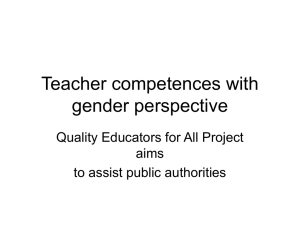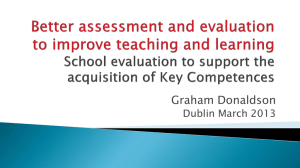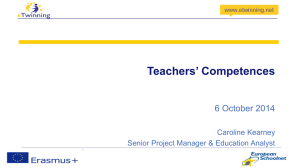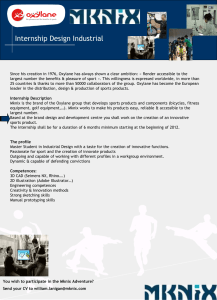Document
advertisement
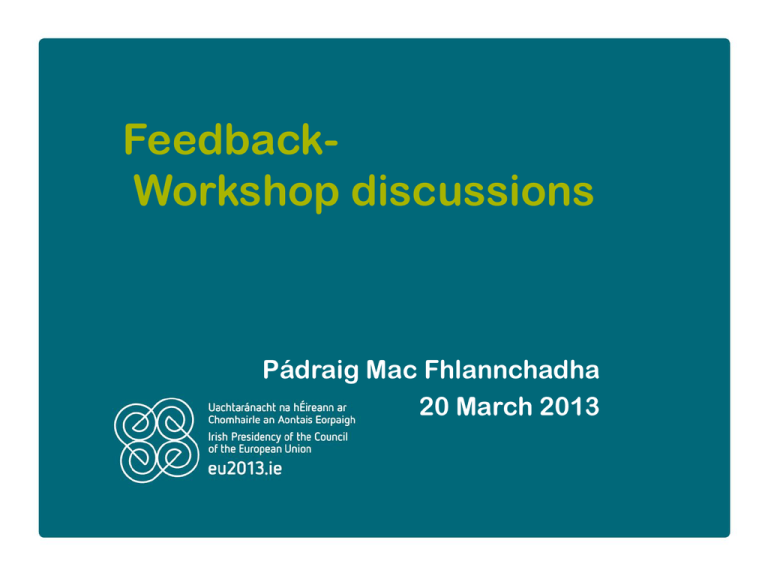
FeedbackWorkshop discussions Pádraig Mac Fhlannchadha 20 March 2013 Workshops - Comparing Country Approaches to Assessing Key Competences (Key Co Net) - Evaluation and Assessment: Policy and Practice in Denmark - Evaluation and Assessment: Policy and Practice in Northern Ireland - The use of ICT for the Assessment of Key Competences Key questions - How can evaluation and assessment be used more effectively to support the acquisition of key competences? - How can we realise the potential of ICT to measure key competences? Key messages- Key Co Net - A flexible approach needed in the use of the key competence framework - Assessment within or outside the curriculum? - Assess key competences within the curriculum (within the subject) - Anchor competences in a common framework and win support of stakeholders (e.g. Vienna, Austria) - Ensure that formalisation and assessment of key competences does not detract from teaching of key competencies Key messages- Key Co Net - Cross curricular approaches facilitate and promote key competence approach e.g. Finland, Sweden and Denmark - Use of project-based assessments - Increasingly in use to measure key competences - Caution: need for checks and balances if work completed outside of school to ensure social equity Key messages- Key Co Net - Portfolios have potential to assess key competences • Can assess skills which exams can’t • Used widely but varied practice •Self assessment •Inform discussions with parents •In teacher education to promote self evaluation • Challenges -Time consuming for students -Changing teachers to portfolio approach- use contingent on perception of value -Legislative changes required in some countries to facilitate their use Key messages- Key Co Net • Potential of ICT to measure key competences either alone or with paper and pen tests – Can accommodate a process orientated approach (e.g. Sweden and Denmark) – Facilitates electronic portfolios that follow learners (e.g. Slovenia) – Increases learner motivation – Facilitate ease of feedback giving and record keeping Key messages- Key Co Net • Challenges to ICT use – Danger of measuring ICT competences rather than the other competences – Takes time for electronic and pedagogical issues to be sorted Key Messages- Policy and practice in Denmark - Challenges in developing an evaluation culture where there is none - Designing assessments to test competences can drive focus on competences in teaching and learning - Test students on how well they apply their learning - Wide range of national tests and multiple forms of examination - Examinations are open book and open internetunseen texts and contexts Key Message Policy and practice in Denmark - Potential of ICT -Embracing ICT in assessments (e.g. open access to internet by students) can drive its use as part of learning in classrooms -Can truly examine ability e.g. adaptive examination questions in response to student performance -Students interested in own progress and more eager for feedback as immediate Key Messages- Policy and Practice Northern Ireland - Bring about system improvement leading to better learner outcomes is complex- different starting points, contextual realities, choices re what to do - Should align evaluation and assessment with other drivers of improvement such as policy development and curriculum change, building capacity of teachers (instructional skills) and principals (management skills) - System improvement not about quick fixes- need to get building blocks right- graft and grow not cut and paste Key Messages- Policy and Practice Northern Ireland - Useful for schools to benchmark performance and set improvement targets in light of availability of comprehensive data on schools similar to themselves - School evaluation most effective when external evaluation and self evaluation processes are complementary - Policy development more effective if schools see this as being important to them - Focus must remain on the learner Key Messages- Assessment of ICT workshop - Need to move from a focus on the use of ICT for testing (e.g. administration and scoring of conventional tests and adaptive testing) to a focus on its use for learning (e.g., continuous integrated assessment and personalised feedback and tutoring) - ICT can facilitate the assessment of the process not just the result - Pedagogical priorities should drive the solutions offered by technology not other way around Key Messages- Assessment of ICT workshop - Use a range of tools to assess competences - CBA, quizzes and simple games - E-portfolios, peer assessment and self assessment - Virtual worlds/games - Different tools can be used to measure different competences e.g. e-portfolios- communication in mother tongue and foreign languages; peer assessment and self assessment- learning to learn - Some competences present challenge for assessment in e.g. attitudes, initiative and entrepreneurship Key Messages- Use of ICT for assessment - Macro factors: - Prioritisation at national level based on experiences on ground - Positive attitudes to ICT in education - Investment - CPD for teachers - Get publishers to develop electronic environments that reflect the curriculum - Build teacher capacity- respect for work of teacher, incentives, acknowledgement of those who use ICT, establishment of teacher networks Question for further consideration - How can we ensure that the assessment of key competences does not undermine the integrity of the key competences?

